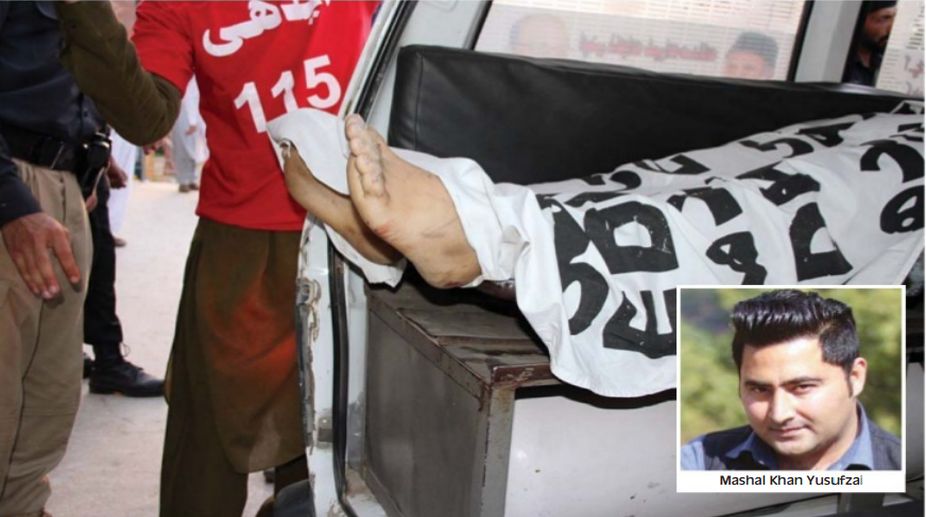China-made drone seized near India-Pak border in Punjab
Acting on a tip off, the BSF troops carried out an extensive search operation in the suspected area.

Mashal Khan Yusufzai (PHOTO: SNS)
Prime Minister Nawaz Sharif’s hollow claims (March 14) that in Pakistan all faiths enjoy equal rights under the Constitution fell flat when a 23-yearold student, Mashal, a member of the minority Ahmediya sect was lynched to death by a frenzied mob inside the campus of Abdul Wali Khan University in Khyber Pakhtunwa (KP) province last week on mere suspicion that he had championed the cause of Ahmediyas.
The attack was most inhuman as the perpetrators kept kicking the lifeless body displaying high level of intolerance and brutality. Before he was lynched and shot, Mashal was forced to recite Quranic verses and made to hurl abuses on the Ahmediya sect. This sensational killing and its ripple effects have exposed Pakistani claims of protecting their minorities. It’s also evident that there are visible signs of state complicity in such hate killings.
Earlier, a new wave of persecution and killings of Ahmediyas came to the fore after an Islamabad High Court Judge, Shaukat Siddiqui, described by many as a bigot and hate monger, took a position on religious matters of an individual. Religious extremism penetrating the judiciary is a very disturbing development and diminishes chances of ensuring minority security.
Advertisement
Siddiqui was the judge who had described Constable Mumtaz Qadri as Ghazi (hero and holy warrior for upholding the teachings of Islam). Qadri had assassinated his minister Salman Taseer whom as a bodyguard he was supposed to protect. It’s unthinkable that a sitting judge would label a killer a hero and a martyr (Qadri was later executed).
Sadly, the judiciary in Pakistan has not been able to keep itself away from the profound impact of growing extremism. Human rights watchers recommend a foolproof system be set in place to check and occasionally scrutinise the fairness of the justice system so that it does not stay unbridled and awards sentences with fairness and without bias.
In the absence of any monitoring, Siddiqui continues to try cases of alleged blasphemy and he is directing the authorities to ban accused persons’ accounts on Facebook, Twitter and the internet confirming the extent of intolerance Pakistan is reeling under. Ahmediyas remain harassed and ostracised in Pakistani society and continue to suffer humiliation and intimidation at the hands of the religious extremists. Emboldened by the indifference of the establishment and the apathy of the majority, several members of the Ahmediya community have been gunned down in the recent past. A prominent member of the sect and lawyer of renown, Malik Saleem Latif was shot dead in Nankana Sahib and soon after a 68-year-old social activist Ashfaq Ahmed was shot dead in cold blood in Lahore on April 7.
The atrocities don’t end here. Minorities are gripped by fear and uncertainty and there are no evident signs of any let up at least in the foreseeable future. Against this backdrop, it does not augur well for the Pakistani polity or its intelligence and security agencies to point fingers at India for its alleged highhandedness in Kashmir. Its sustained propaganda blitz against India merits a natural death as atrocities in Pakistan’s own backyard deserve to be highlighted and exposed before the international community and human rights groups.
The writer is a retired IPS officer and a security analyst and writes on security-related issues. The views expressed are personal.
Advertisement